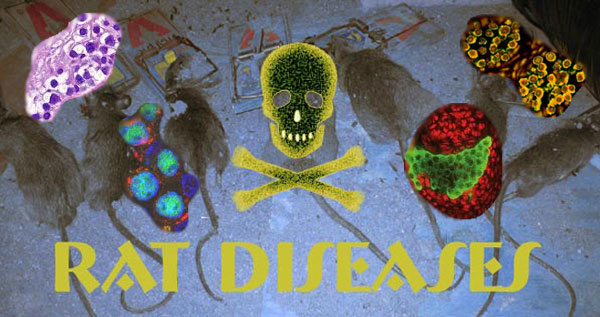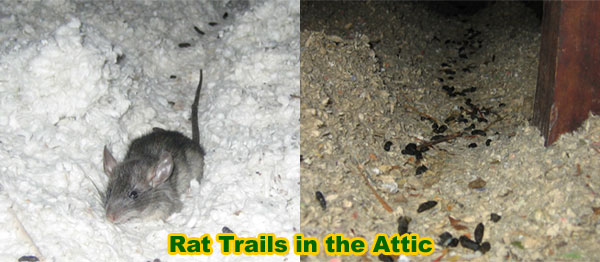Large rat feces -
Large rat feces means that somewhere, somehow, a rat managed to get inside of your home. Most rats have large droppings, about the size of a bean. If the fecal material you discovered is larger than that, consider looking into the other nuisance animals that may be the cause. Opossums and raccoons are frequent attic visitors and leave sizeable droppings. Most homeowners think droppings immediately mean setting out traps. This is correct, but it is not the first step that needs to be accomplished. Before you can trap a rodent in your home, you need to repair the hole that let the creature into the building. For a rat, this opening does not have to be very large; an opening the size of a quarter will let in a rat. Find this opening and seal it. Do not worry about rats that may be inside of the home. These pests will be easily trapped and removed without the worry of new rats joining the fray. When you are certain the exterior of your home has been repaired, the snap traps can be placed in the area where you found the droppings.

How to neutralize rat urine -
The ability to neutralize rat urine is found in some enzymatic cleaners. These solutions will be able to bind with the urine particles and eliminate the odor. Whatever you do, do not use bleach on urine. Bleach and ammonia, a substance in urine, combine to make Mustard Gas. Mustard Gas was used in warfare to debilitate the enemy. When inhaled, it can create blister in the lungs and can result in permanent damage. If you do not have access to the type of cleaner needed, Dawn dish soap can be a reliable substitute. Dawn is petroleum based and works well to lift particles from surfaces. Dish soap may not do much for the odor associated with urine, but it will serve to clean the area as best as possible until the appropriate cleaner can be purchased. You can, of course, prevent urine all together by keeping rats out of your home. By sealing up the holes in the exterior of the building, you will prevent rats from getting inside. If the rodents have no way to enter, you will never have to worry about them leaving puddles of urine around the home.

Rodent disease mask -
There are many reasons why you should protect yourself when cleaning up after rodents. These animals carry over thirty diseases, and many of those diseases can cause serious health issues for humans. Tularemia and Hantavirus are two of the most common, serious illnesses associated with rodents and their excrement. Both diseases present with symptoms similar to those of the flu. While Tularemia is treatable and rarely fatal, Hantavirus has a high death rate among those individuals who have lung involvement. Both illnesses do not have to come directly from the rat or mouse. Hantavirus is easily lifted into the air, and people can come into contact with it just from breathing inside a room with rodent waste. Tularemia can be spread through the ticks and fleas that hitch free rides on the rodents invading your home. Even if these two potentially deadly diseases were not an issue, lesser illnesses like Salmonella and Leptospirosis should also be considered. While it is rare, all four mentioned illnesses to hold the potential to be fatal. It is well worth the time to go pick out a respirator mask before you attempt any major cleaning process after a rodent infestation.
 Do You Need Help?
Do You Need Help? I wrote this website to provide information on How to Get Rid of Rats in the Restaurant in the case that you have
a rat problem and need to make an informed decision about what to do. If you
have any questions you may email me, but I do know from experience
that rat removal is not simple. If you need professional help solving your
wildlife conflict, I recommend that you talk to a professional rat
control expert in your town by clicking on my
National Wildlife Control
directory, which lists experts who I recommend in every USA city and town who can
help you with your rat issue in the Restaurant.
More Rat Articles I've Written:
How to Get Rid of Dead Rats
How to Kill Rats
Rat Repellent
How to Get Rid of Rats in Your House
How to Get Rid of Rats in Your Walls
How to Get Rid of Rats in Your Kitchen
How to Get Rid of Rats in Your Garage
How to Get Rid of Rats in Your Attic
How to Get Rid of Rats in a Barn
How to Get Rid of Rats in Your Basement
How to Get Rid of Rats in the Ceiling
How to Get Rid of Rats in Your Garden
How to Get Rid of Rats in the Insulation
How to Get Rid of Rats in the Crawlspace
How to Get Rid of Rats in Your Yard
How to Get Rid of Rats in a Restaurant
Roof rat poop -
Black rats, also known as roof rats, leave behind the standard feces of most rodents their size. It can be very difficult to tell rat poop from squirrel poop, though squirrel poop is usually larger and more random in distribution throughout a space. Roof rat droppings will be oblong and the size of a bean with a tapered end. These droppings often have a spiral look to them. If you have indeed discovered roof rat droppings you need to initiate trapping and removal as soon as possible. Rats will damage a home but they will also spread diseases. To get rid of roof rats, find where they are entering the building ad seal that opening off. You will need to use a thick material that will not be easily chewed through. Once the opening is sealed, purchase some snap traps and cart them to the area where you found the rat droppings. Rats will return to the same areas where they defecated. Setting up a baited trap in these areas is very effective. Be sure to remove any dead rats as they are captured. Rats will be cannibalistic and will feed on their housemates if the remains are left in the trap.